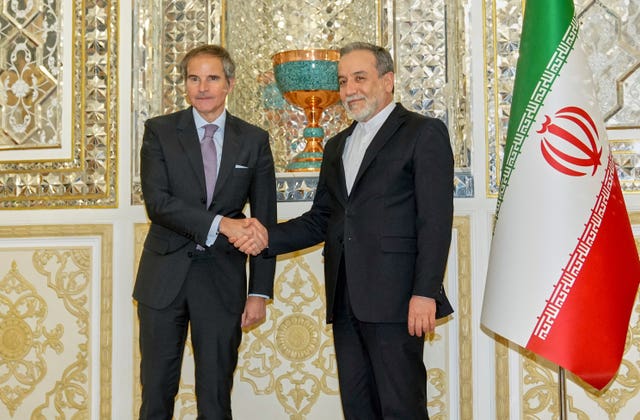Iran ready to consider surveillance of nuclear sites, UN watchdog head says
He called it an encouraging signal of Iran’s attitude toward nuclear talks with the United States.

Iran has agreed to allow in an International Atomic Energy Agency technical team in the coming days to discuss restoring camera surveillance at nuclear sites, the head of the UN nuclear watchdog said.
He called it an encouraging signal of Iran’s attitude toward nuclear talks with the United States.
Rafael Mariano Grossi, speaking to reporters in Washington after meeting with Iranian officials in Tehran last week, joined the US and Iranian sides in projecting optimism after a second round of negotiations over the Islamic Republic’s rapidly advancing nuclear programme.
Technical-level talks were expected this week.
Iranian leaders were engaged “with a sense of trying to get to an agreement”, Mr Grossi said.
“That is my impression.”
The US is looking to ensure Iran doesn’t develop nuclear weapons, while Iran wants the easing of sanctions that have damaged its economy.
After President Donald Trump pulled the US out of an Iran’s nuclear deal with world powers in his first term, it responded by curtailing access and monitoring by the IAEA at nuclear sites.
Since then, Iran has pressed ahead on enriching and stockpiling uranium that is closer to weapons-grade levels, the agency says.
Iranian Supreme Ali Khamenei long has refrained from ordering the final steps needed to make nuclear bombs.
Iranian leaders say their nuclear sites are for civilian purposes only.
Iran resumed talks with the months-old second Trump administration, in the face of threatened Israeli or US strikes aimed at disabling Iran’s nuclear programme by force.

Mr Grossi said Iranian officials during his visit there last week agreed to allow in an IAEA technical team to discuss resuming access to and monitoring of nuclear sites, among other issues.
While that move was not directly linked to the US talks, he called it an encouraging sign of Iran’s willingness to reach terms in a potential deal.
The IAEA is not playing a direct role in the talks, and Mr Trump’s Republican administration has not asked it to, Mr Grossi told reporters.
That Iran and the US sought to resolve the issue peacefully was more important than whether UN nuclear monitors take part, he said.
But when it comes to ensuring Iranian compliance with any deal, he said, “this will have to be verified by the IAEA”.
“I cannot imagine how you could put … a corps of invented international or national inspectors to inspect Iran” without having the agency’s decades of expertise, he said.
“I think it would be problematic and strange.”





